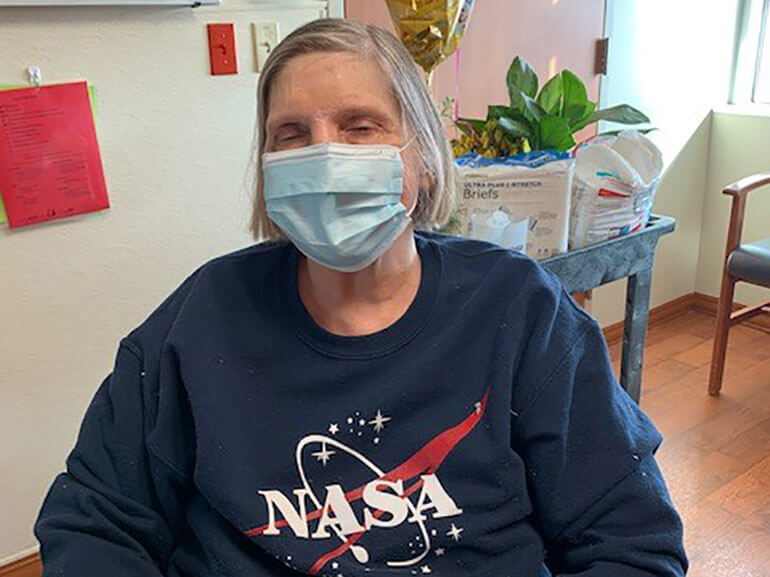Michelle's story

Michelle Van Meter, 70, of St. Louis was spending her Saturday like many others – she and her husband had just returned from getting ice cream when she suddenly began to experience a terrible headache. Michelle had migraines in the past, but this headache was different; it affected her entire head. She began to sweat and laid down to rest. When she did not feel better, her husband called 911. An ambulance was sent to their home and took her to SSM Health DePaul Hospital.
After some testing at the hospital, it was determined that Michelle had some internal bleeding in her head and suffered a stroke. Doctors were hesitant to operate right away, so they waited a few days to see if Michelle’s condition improved with medication. Fortunately, things did improve, so surgery was not necessary, but the stroke left her with speech and swallowing difficulties and unable to eat or drink, which required the placement of a feeding tube. Michelle was able to walk, but required assistance to do so safely.
Michelle spent 10 days in the hospital before she was stable enough to be transferred to SSM Health Rehabilitation Hospital – Bridgeton to continue her recovery. Upon arrival, Michelle could only walk short distances and required the assistance of three people. The right side of her body was weak and she was experiencing severe ataxia, or impaired coordination. Michelle required maximum assistance for getting in and out of bed as well as her personal care. Initially, staff could understand single words that Michelle spoke, as she had difficulty staying awake long enough to speak in complete sentences. Her team of physicians, nurses and physical, occupational and speech therapists worked to develop a plan of care that would help Michelle regain her strength and independence.
For the first few days in rehabilitation, Michelle was very lethargic, confused and unable to consistently follow commands. Gradually, she began to improve and started making daily progress toward her goals. Physical therapists worked with Michelle on walking and balance by using mirrors and weights on her ankles and a rolling walker to improve her body awareness, motor control and stability.
Speech therapists guided Michelle with exercises to not only help with speech, which was very quiet and difficult to understand, but her ability to swallow, drink and eat. Therapists encouraged Michelle to start with simple words and phrases and to think about the words before she spoke them. Within a week, Michelle became less lethargic and more interactive, and her communication quickly improved. Soon after, she completed a swallow test which she passed, allowing her to start eating and drinking by mouth. As Michelle progressed in speech therapy, her personality really started to shine; she was able to communicate freely, talk to her husband on the phone and eat a normal diet.
In occupational therapy, therapists worked with Michelle on new and different ways to complete her personal care, including brushing her teeth and getting dressed. Her occupational therapy sessions consisted of exercises and activities that helped improve control of her arms, fine motor coordination, standing balance and endurance. Michelle’s husband underwent family training with her therapists so he could learn how to better help Michelle once she returned home.
During her three-week stay at SSM Health Rehabilitation Hospital, Michelle improved significantly each week and became extremely motivated to keep progressing. After 21 days, she had regained her independence in completing personal care and was able to walk more than 300 feet with a walker and minimal assistance. She had also made great strides in her right side strength, awareness, speech and cognitive function. Michelle was able to engage in conversation, make appropriate jokes and laugh.
In fact, when asked if she has any advice for others facing a similar recovery, she joked, “Don’t have a stroke.” She continues, “But if you do, follow the directions that are given by the staff about ways to get better. They are there to help.”